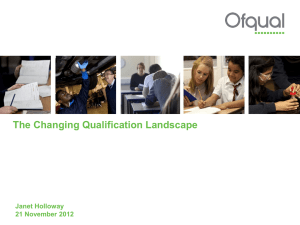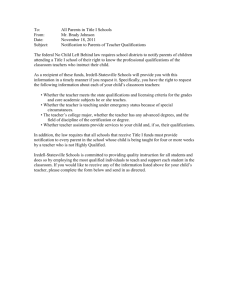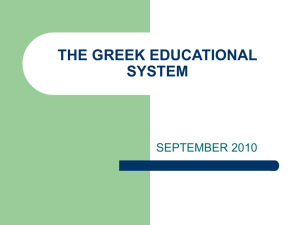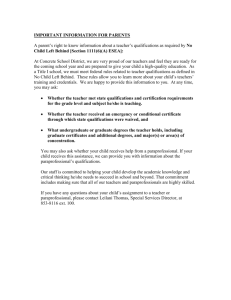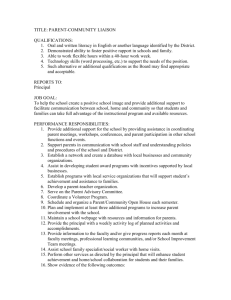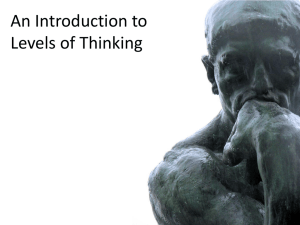Miniversion: Teachers` quality in Poland
advertisement
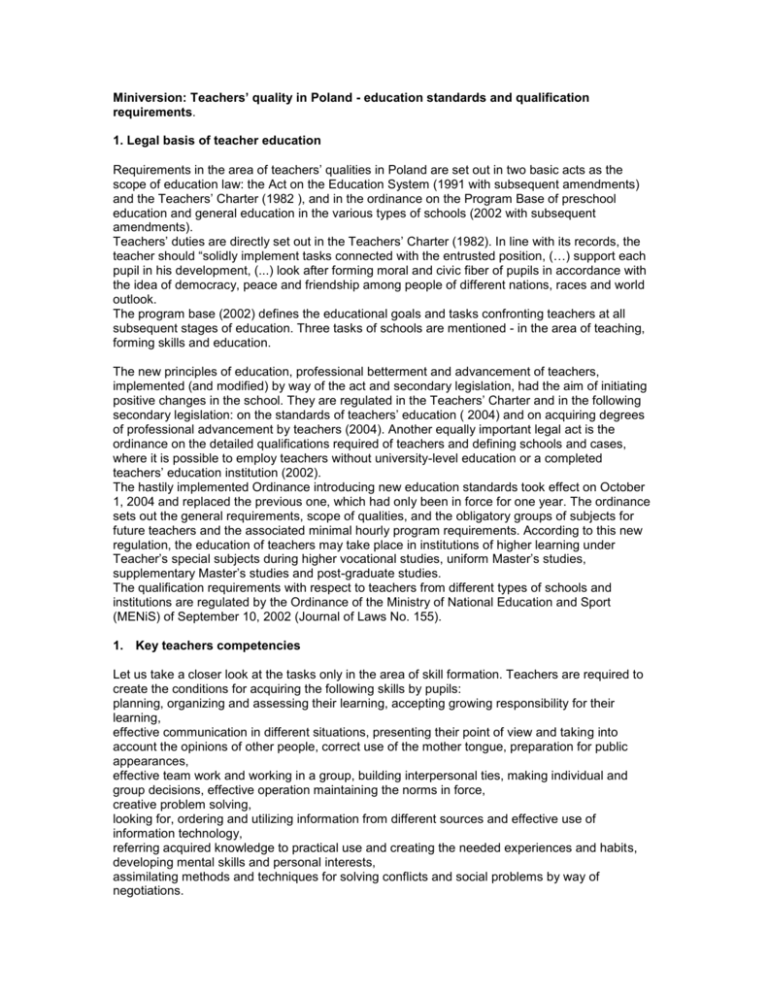
Miniversion: Teachers’ quality in Poland - education standards and qualification requirements. 1. Legal basis of teacher education Requirements in the area of teachers’ qualities in Poland are set out in two basic acts as the scope of education law: the Act on the Education System (1991 with subsequent amendments) and the Teachers’ Charter (1982 ), and in the ordinance on the Program Base of preschool education and general education in the various types of schools (2002 with subsequent amendments). Teachers’ duties are directly set out in the Teachers’ Charter (1982). In line with its records, the teacher should “solidly implement tasks connected with the entrusted position, (…) support each pupil in his development, (...) look after forming moral and civic fiber of pupils in accordance with the idea of democracy, peace and friendship among people of different nations, races and world outlook. The program base (2002) defines the educational goals and tasks confronting teachers at all subsequent stages of education. Three tasks of schools are mentioned - in the area of teaching, forming skills and education. The new principles of education, professional betterment and advancement of teachers, implemented (and modified) by way of the act and secondary legislation, had the aim of initiating positive changes in the school. They are regulated in the Teachers’ Charter and in the following secondary legislation: on the standards of teachers’ education ( 2004) and on acquiring degrees of professional advancement by teachers (2004). Another equally important legal act is the ordinance on the detailed qualifications required of teachers and defining schools and cases, where it is possible to employ teachers without university-level education or a completed teachers’ education institution (2002). The hastily implemented Ordinance introducing new education standards took effect on October 1, 2004 and replaced the previous one, which had only been in force for one year. The ordinance sets out the general requirements, scope of qualities, and the obligatory groups of subjects for future teachers and the associated minimal hourly program requirements. According to this new regulation, the education of teachers may take place in institutions of higher learning under Teacher’s special subjects during higher vocational studies, uniform Master’s studies, supplementary Master’s studies and post-graduate studies. The qualification requirements with respect to teachers from different types of schools and institutions are regulated by the Ordinance of the Ministry of National Education and Sport (MENiS) of September 10, 2002 (Journal of Laws No. 155). 1. Key teachers competencies Let us take a closer look at the tasks only in the area of skill formation. Teachers are required to create the conditions for acquiring the following skills by pupils: planning, organizing and assessing their learning, accepting growing responsibility for their learning, effective communication in different situations, presenting their point of view and taking into account the opinions of other people, correct use of the mother tongue, preparation for public appearances, effective team work and working in a group, building interpersonal ties, making individual and group decisions, effective operation maintaining the norms in force, creative problem solving, looking for, ordering and utilizing information from different sources and effective use of information technology, referring acquired knowledge to practical use and creating the needed experiences and habits, developing mental skills and personal interests, assimilating methods and techniques for solving conflicts and social problems by way of negotiations. In educational work, on the other hand, teachers should be fully responsible for solving all educational problems of their pupils and obtain assistance from school educators and employees of psychological & pedagogical clinics. The scope of education of future teachers was expanded from the three previously obligatory elements by two new ones. Education in the area of IT includes preparing the graduates to use it in the didactic process, and education in the area of foreign languages is to enable the acquisition of advanced knowledge of the language, measured by standards agreed upon by the European Council. It should also be added that the set of desired teachers’ qualities also includes qualities that are less explicit, described in a more general way, e.g. requirements concerning creativity, innovation and non-standard thinking, adaptive skills, mobility and flexibility. Teachers should also be able to cope with complicated social situations at school, have respect for others and themselves, be conscious of their rights, uphold their professional dignity and respect the dignity of the pupil as a person. The model teacher is intellectually independent in creating and verifying projects of own activities and prepared to undertake activities generalizing models of good practice, capable of managing own professional and personal development, undertaking personal betterment also in cooperation with other teachers. He can rationally plan the process of upbringing and education in the context of the initial situation (of pupils and himself) and the school’s educational tasks. Finally, there is mention of preparing the teacher to treat the internal regulations defining the operating conditions of the school as facilitating the initiation and implementation of educational processes in physically and psychically safe conditions. In connection with the tasks and responsibility tied with the profession, teachers should constantly be involved in raising their qualifications. 3. Qualifying to teach (training, qualifications) Let us take a closer look at the regulations by law defining the qualifications in the teaching profession. All teachers must have a background in pedagogy, i.e. they must acquire the knowledge and skills in the area of psychology, pedagogy, and detailed didactics, which should be related with the specialization (special subject) of education and pedagogic practice. On the other hand, requirements in the area of preparation based on merit depend on the level of education and the type of school, where the teacher is employed. Teachers working in general secondary schools, profile secondary schools, technical schools, and vocational secondary schools must have at least one of the following diplomas: of completing Master’s studies in a specialization or special subject in line with or related to the taught subject or type of conducted activity or completing Master’s studies in a specialization other than the taught subject or type of conducted activity and completing post-graduate studies in the area of teaching the subject or type of conducted activity. Teachers employed in a school of a lower level of education - gymnasium - should have an education required of teachers employed in the above-mentioned secondary schools or have a diploma: of completing vocational university-level studies in the specialization (special subject) in line with or related to the taught subject or type of conducted activity or completing Master’s studies or vocational university-level studies in a specialization other than the taught subject or type of conducted activity and completing post-graduate studies or a qualification course in the area of the taught subject or type of conducted activity. Teachers with qualifications based on merit required to work in secondary schools and gymnasiums, as well as teachers with the following diplomas of completing a teachers’ education institution in a special subject in line with the taught subject or type of conducted activity or completing a teachers’ education institution in a special subject other than the taught subject or type of conducted activity and completing a qualification course in the area of the taught subject or type of conducted activity, may of course be employed in primary schools, basic schools, basic vocational schools. The qualification requirements formulated with respect to teachers from primary schools and gymnasiums, for whom it may be enough to complete a qualification course, to teach a new subject are in a logical contradiction with the high requirements found in the previously analyzed ordinance on teachers’ educational standards. The qualifications needed to teach foreign languages are defined separately in the regulation. A teacher, who has acquired an education according to the previously presented standards and complies with the requirements in the area of professional qualifications, may start work in a school. The Teachers’ Charter, in section 3a gives the precise stages of the teacher’s professional career. There are four steps on this ladder. The teacher starts work in school as a student teacher and depending on his professional achievements and after fulfilling the conditions envisaged by the law may during his career become: a contract teacher, an appointed teacher and a qualified1 teacher, in that order. The exception to this rule is that on the day of starting work in school, a teacher without the degree of professional advancement acquires the title of student teacher is introduced by Art. 9 a par. 3. According to this article, academic teachers working for at least three years in an institution of higher learning and other persons with a period of work of at least five years and significant achievements acquire on the day of establishing the work contract in school the degree of contract teacher. 1


